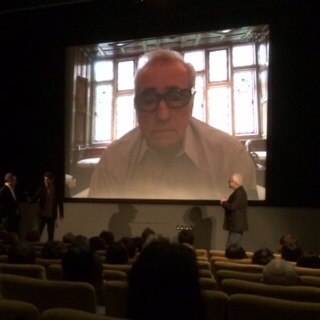
Yesterday the Sheffield Doc/Fest premiered Martin Scorsese's new documentary about the New York Review of Books. The 50 Year Argument shows the power of ideas in influencing and reporting history. It also gives a flavour of life in Bob Silver's office filled with leaning towers of books. After the screening Scorsese joined the Sheffield audience for a Q and A. He said a lot – here are some of his comments about making the film.
Moderator: Welcome to Sheffield
MS Thank you, pleasure.
Questioner: They [the Review founders] were able to maintain a spirit and an ethos and ethics through incredible social and political change. How are they able to do that, was there a tension in that and what can we learn?
Martin Scorsese: I think, having worked on it for a year and a half now it's certainly initial like-mindedness, even though they may disagree with each other there's a great like-mindedness and that's about going beyond perceived acceptance of reality, saying it can't be that simple, I think we might be acting out of emotional hysteria. And having an enjoyment but also a fighting spirit to make sure that another side of the issue is heard or explored as opposed to popular criticism, popular belief.
Q: Could you tell us the difference between doing something like this and a rock documentary like your Dylan or Rolling Stones? What did you bring to this?
MS: What they brought to us was a great challenge to David [co-director David Tedeschi] and myself. In deciding to work on these stories, Bob Dylan, George Harrison the idea was to let the music carry us and let the music tell the story. What I mean by that is not the lyrics of the music, it's the tone of it, a sense of trying to create a story like a piece of music. Here we don't have that, here we have language, here we have ideas. And I think David and Mike and everybody did an incredible job in trying to visualise and have a visual supplement to the language that's used, using the ideas of the writers and the contributors like music. This was a big challenge. It was a matter of making that committee of the New York Review of Books interesting visually to a younger audience possibly, to people who might not have read it. To make it something that hopefully is memorable, that makes you want to read every article in the New York Review. Which is difficult!
Q: I found it very educational. In terms of filmmakers what were the biggest difficulties and obstacles you faced making this film?
MS: Deciding which [contributors] to highlight without making it seem a chronological history which would take us emotionally and musically to the next topic. Time and space – we had to go beyond that.
Q: I thought the film was wonderful on so many different levels…it was genius…I can't believe I'm actually talking to Martin Scorsese here.
MS: Thank you
Q: What political messages do you think the film conveys either intentionally or unintentionally?
MS: Well, it's predisposed to human rights, the Review and that's something we should all be concerned about. It's a community of ideas, which can't be censored.
Moderator: Thank you so much for your time. You've been fantastic.
MS: Thank you.
